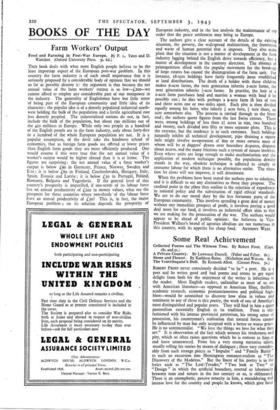BOOKS OF THE DAY
Farm Workers' Output
Food and Farming in Post-War Europe. By P. L. Yates and D. Warriner. (Oxford University Press. 3s. 6d.)
THIS book deals with what most English people believe to be the least important aspect of the European post-war problem. In this country the farm industry is of such small importance that it is seriously proposed by a considerable body of opinion that we should so far as possible destroy it: the argument is that because the net annual value of the farm workers' output is so low—£2oo—we cannot afford to employ any considerable part of our manpower in the industry. The generality of Englishmen have but little sense of being part of the European community and little • idea of its character : the pOpular idea is of a densely populated industrial north- west holding the bulk of the population and a fertile agricultural east less densely peopled. The industrialised nations do not, in fact, include the bulk of the population, but about zsio millions out of the 420 millions in Europe. While only two people in a hundred of the English people are in the farm industry, only about forty-five in a hundred of the whole European population are not. It is a popular assumption, of the devil take the hindmost school of economics, that as foreign farm goods are offered at lower prices than English farm goods they are more efficiently produced. One would assume if this were true that the net annual value of a worker's output would be higher abroad than it is at home. The figures are surprising : the net annual value of a farm worker's output is below £90 in Germany, France, Norway, Sweden and Eire ; it is below L6o in Finland, Czechoslovakia, Hungary, Italy, Spain, Estonia and Latvia ; it is below I.3o in Portugal, Polind, Rumania, Bulgaria and Yugoslavia. If the general level of this country's prosperity is imperilled, if one-tenth of its labour force has an annual productivity of L200 in money values, what are the prospects for those countries where two-thirds of the labour force have an annual productivity of L30? This is, in fact, the major European problem ? on its solution depends the prosperity of
European industry, and in the last analysis the maintenance of any order that the peace settlement may bring to Europe.
The authors give a clear account of the details of the existing situation, the poverty, the widespread malnutrition, the frustration and waste of human potential that it imposes. They also make plain that the situation is not a matter of development m the farm industry lagging behind the English drive towards efficiency, but a matter of development in the contrary direction. The absence of primogeniture allied with the popular movement for the break-up of large estates has caused the disintegration of the farm unit. For instance, a8-acre holdings have fairly frequently been established at land distributions. The death of a holder with three children makes 6-acre farms, the next generation inherits 2-acre farms, the next generation inherits i-acre farms. In practice, the heir of a 2-acre farm purchases land and marries a woman with land if he possibly can ; he dies with perhaps a 9-acre farm ih lots of two and three acres one or two miles apart. Each plot is then divided
equally among his heirs, who inherit acre here, acre there, an acre somewhere else. The process is carried through to the bitter end ; the authors quote figures from the last Swiss census. There were, among holdings of less than 21- acres in size, two hundred and twenty, each divided into fifty or more separate plots. This is the extreme, but the tendency is to such extremes. Such holdings naturally inhibit all technical development, pipe draining a square mile might involve co-operation of 600 or more owners most of whom will be at daggers' drawn over boundary disputes, disputes about access, and the many frictions such a system of tenure involves. Even where units are large enough to make mechanisation and the application of modern technique possible, the population density stands in the way, obsolete technique is adhered to simply to consume labour for which there is no alternative outlet. The situa- tion let alone will not improve, it will deteriorate.
When the problems have been stated the authors pass to solutions, and it is difficult to see any alternatives to those they propose. The
cardinal point in the plans they outline is the rejection of expediency in national policy and the substitution of rigid ethical' standards. We are to do our moral duty by the less fortunate parts of the European community. This involves spending a great deal of money without any immediate prospect of profit, it involves paying a good deal more for our food, it involves an industrial effort akin to that
we are making for the prosecution of the war. The authors would appear to be ahead of public opinion : the believers in Vice- President Wallace's brand of agrarian idealism are not numerous in this country, with its appetite for cheap food. ANTHONY WEST.


























 Previous page
Previous page